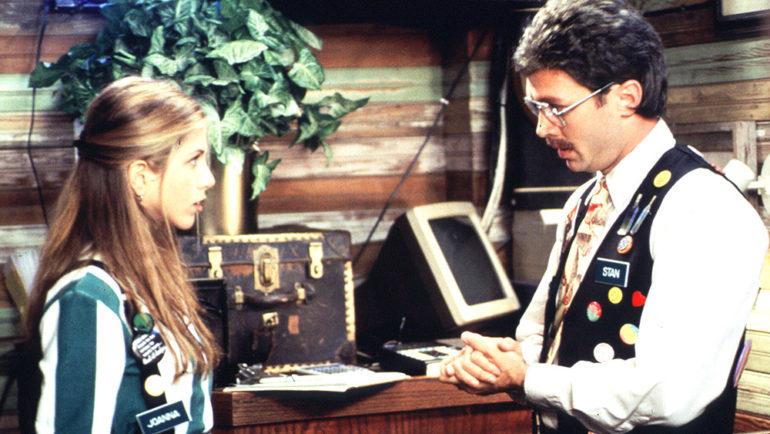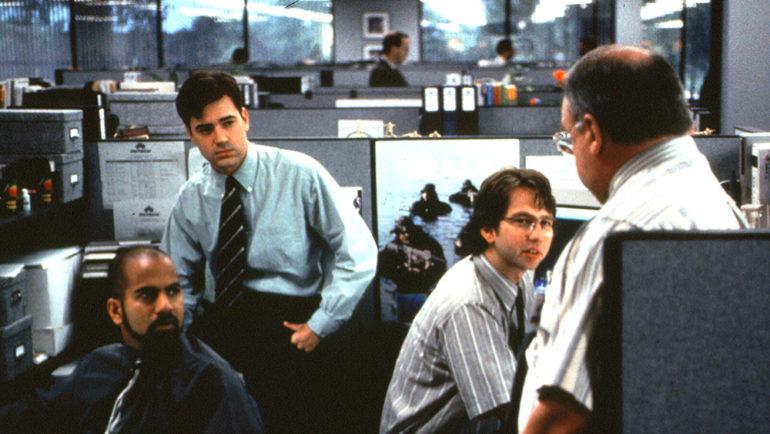‘Office Space’ Turns 20: How Mike Judge Brought Flair, Assclowns and Red Staplers to the World
By Susan King
LOS ANGELES (Variety.com) – Mike Judge’s workplace satire “Office Space,” which celebrates its 20th anniversary Feb. 19, was a bona fide box office flop when it grossed a measly $10.8 million in 1999. But once the comedy was discovered on DVD and cable, “” became a cult sensation, spreading concepts like “flair” and “assclown” across pop culture.
The now-classic comedy will be celebrated at the upcoming Texas Film Awards , where it will be inducted into the Texas Film Hall of Fame. Judge and the cast will reunite for a screening and panel March 7 in Austin.
Servers at T.G.I. Friday’s might want to raise a glass to “Office Space,” because according to a 2004 New York Magazine interview with Judge, the restaurant not only got rid of its dorky striped shirts but also the mandatory flurry of pins and buttons — known as “flair” — a few years after the film was released.
It was all because of the criticism Jennifer Aniston’s character, Joanna, suffered as a waitress at Friday’s-esque restaurant Chotchkie’s, for not wearing enough pieces of flair.
“We need to talk about your flair,” says her boss, played by Judge. “Fifteen is the minimum, okay?”
“About four years after ‘Office Space’ came out, T.G. I. Friday’s got rid of all that flair, because people would come in and make cracks about it,” he told the magazine. “So, maybe I made the world a better place.”
“Office Space,” which marked the live-action directorial debut of Judge, best known at the time for the animated TV series “Beavis and Butt-Head” and “King of the Hill,” revolves around everyman Peter Gibbons (Ron Livingston), who works as a programmer at a company called Initech where he hates his job and is constantly bothered by his odious boss Bill Lumbergh (Gary Cole).
His best friends at work are his fellow programmers Samir (Ajay Naidu) and Michael Bolton (David Herman), who live in fear that they will be fired.
Peter’s life changes when his girlfriend takes him to an occupational hypnotherapy session. When the therapist dies while Peter is still hypnotized, he wakes up the next morning carefree and relaxed. He breaks up with his girlfriend and begins dating Joanna. And instead of getting in trouble with his new laid-back attitude at work, his bosses love his newfound perception.
When Peter discovers that his friends will be fired, the three hack the company’s computer accounting system, diverting small monies into their account. But, of course, it doesn’t turn out quite the way they expected.
“Office Space” was based on the “Milton” animated shorts Judge created and voiced in the early 1990s, as well as his own experiences working as an engineer — which years later, also made Judge’s “Silicon Valley” feel painfully real.
“The main message of the movie is, you got to give yourself permission to do the things that make you happy even if it’s going to disappoint your employer,” explained Livingston, who is currently playing an executive who commits suicide in ABC’s “A Million Little Things.”
For the past 20 years, he noted, “People come and tell me that the movie changed their life. It’s like after seeing the movie, it gave them the confidence to get out of whatever it was they were doing that was making them miserable and move on to something else. I only hear from the people for whom that worked out, but hopefully there’s not too many that regret it.”
In an email interview, Judge said he gets the same reaction from fans. “I haven’t had anyone say they quit their job after watching the movie and wound up on welfare,” he added.
Livingston tries to downplay his role in the cult hit. “For me, the movie is about everybody else,” he said. “I kind of describe it as I’m the bus driver in the movie and the really interesting characters are the ones who get on and off the bus. I’m just there to kind of keep the bus moving forward along the route. “
Herman, who now works primarily as a voice actor, believes that Judge is a visionary. “You know at that time the fluorescent lights and the gray cubicle walls were groundbreaking,” he said. “Those office landscapes, those offices parks… You never saw anything like that. Now every 30 second commercial break you see at least two commercials like that. Every FedEx commercial… But that hasn’t watered down the impact of this movie. People still go ‘that’s my life. ‘”
Judge, he said, “really hit the target perfectly.” Though the film is set in Texas, “this really could be anywhere, America. It is in every way a classic comedy. “
In fact, Herman sees a lot of parallels between his character of Michael Bolton and the roles one of his favorite comic actors, W.C. Fields, essayed over 80 years ago.
Bolton, he said, “is a slave to his life, to this passive aggressive workplace. This life is without an endgame and yet he has to maintain being a man. That’s the struggle with W.C. Fields.”
Judge didn’t realize the impact the film would have. “I was just making a movie about the way it was when I worked those kinds of jobs,” he said. “If anything, I thought I was about ten years too late.” The absurdity of the workplace dynamic certainly carried over when Judge created the award-winning “Silicon Valley.”
Naidu found Judge to be a very hands-off director who let him and Herman have fun together. “There was a lot of improvisation, but there was a lot of ‘stick to the script’ too because the script was genius.”
Fans often bring up one of his favorite scenes, he says — the one in which they are partying and dancing in Peter’s apartment after they install the virus. “I breakdance in that scene and that just happened because Mike said, ‘Guys, you have the space.’ And I did it. It stayed in the movie.
“I really get Mike’s tone,” said Herman, who knew Judge from doing voicework for “King of the Hill.”
“The script was great but there’s a lot of stuff shoehorned in there left and right that we did. At some point, there were hints that people were hoping for a PG-13 rating. I was kind of like ‘what would be the purpose of that?’ You have to be thrown through the system to some degree to get the laughs. So, I would stuff as many blue things as I possibly could between things just so that was never going to be a possibility.”
Speaking of blue, it was Herman who came up with the word assclown to describe the real Michael Bolton, the bland pop singer his character can’t stand.
“I never met him,” said Herman. “I always heard from Mike his reaction was something like a groan when the movie is brought up. I used to say I feel both Michael Boltons have suffered enough. At the time the movie came out he took himself real seriously. Real seriously. So, for an office peon like me to be taking him down felt like a big feat. That is what was cool about it.”
In a meta turn, the real Bolton has now embraced the movie. “There’s an entire version of him doing all the scenes,” said Herman. “You can go on the internet and you can find him doing ‘Office Space.’”
In another “Office Space” effect, office workers and fans can now buy red Swingline staplers, which didn’t exist before the movie was made. In the film, the weird bespectacled office worker Milton (Stephen Root) guards his red stapler as if it was his treasured security blanket.
When it started getting popular in 2000, Swingline began getting calls about the stapler. But the company didn’t sell a red stapler — a prop designer had painted it red for the film. The company soon remedied that with its “Rio Red” stapler. And Yahoo News just reported that for the film’s 20th anniversary, the company is selling an official “Milton’s Swingline Red Stapler” edition.
So why didn’t the subversive comedy catch on in 1998?
Judge believes “Office Space” bombed because “it was a hard movie to make a trailer for — hard to market in general,” he said. “And the trailer wasn’t great. I mean, it was a weird movie at the time.”
He began to notice the tide changing when he overheard people talking about it at a Blockbuster in Austin. “Then I started hearing from the actors that they were getting recognized a lot. It was a slow build. Then around 2003, Fox wanted to do a sequel. If someone had told me that was going to happen on opening weekend in 1999, I would’ve thought they were just making fun of me.”
Could a sequel ever happen after all this time? Never say never.
Back around the film’s 10th anniversary, Judge told Film School Rejects he wouldn’t do it “unless we had a good idea — but you never know.”


